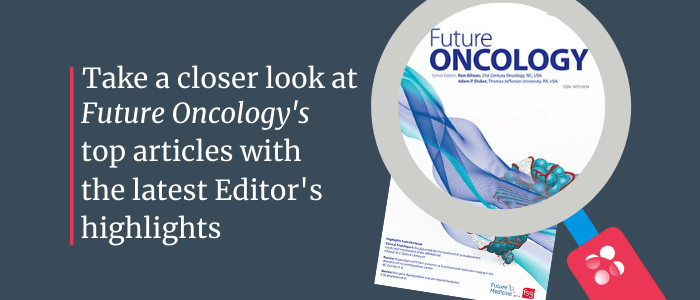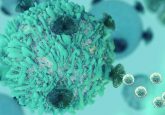Top 5 Future Oncology articles – Editor’s highlights

In this regular column, Rosanna Zolna – Managing Editor at Future Science Group, highlights the top peer-reviewed articles from the recent issues of Future Oncology and provides bitesize summaries of the papers to make them easily digestible for you!
Time to surgery does not affect oncologic outcomes in locally advanced gastric cancer after neoadjuvant chemotherapy: a meta-analysis
Due to the pressures that the COVID-19 pandemic placed on healthcare systems, many cancer patients are experiencing delays in treatment, often due to the deferral of functional surgery. The time intervals between chemotherapy and surgery can impact surgical outcomes, meaning significant delays can be problematic.
The optimal time gap between neoadjuvant chemotherapy and gastrectomy in patients with locally advanced gastric cancer has yet to be outlined and remains controversial. While some are concerned that delays in surgery will result in disease progression, other research has indicated that allowing for more time between neoadjuvant chemotherapy and gastrectomy may improve the rate of pathological response.
The authors of this meta-analysis addressed this controversy and investigated both the association between the time to surgery, and pathological parameters, as well as the impact on surgical outcomes. The authors provide the necessary clarity on this issue, which is particularly pressing due to the delays in treatment experienced by many at the moment.
Voluntary deep inspiration breath-hold with volumetric modulated arc therapy in pediatric patients with mediastinal Hodgkin lymphoma
For more than half a century, radiation therapy has been central in the treatment of Hodkin’s lymphoma (HL). Throughout this time, treatment of HL with chemotherapy and radiation has proven to be highly effective, now yielding a 90% survival rate. Unfortunately, follow-up studies now indicate a notable incidence of late-onset adverse effects that occur as a result of treatment.
In this preliminary research, authors from the Children’s Cancer Hospital, Egypt, examine the potential of a relatively new technique to be applied in mediastinal irradiation. Following its success in breast cancer treatment, researchers in this paper explore how deep inspiration breath-hold (DIBH) could minimize radiation dose to the heart and lungs in patients with pediatric HL, with a view of decreasing the rate of side effects. Furthermore, researchers highlight the patients that this would be most suitable for, promoting a personalized approach to HL treatment.
Intersectionality in patients with cancer: who should care and why?
A vast body of research has indicated how oncologic outcomes have been impacted by marginalisation. However, as the authors of this commentary highlight, this is often overlooked in clinical practice and oncologic research.
Originally coined by legal scholar Kimberlé Crenshaw, the term intersectionality describes how different systems of power and inequality interact, creating nuanced experiences of privilege and discrimination. In this paper, an overview of the origins of intersectionality and its current incorporation into healthcare is discussed. Furthermore, the authors explain the necessity of incorporating intersectionality into clinical practice and oncologic research, allowing medical professionals to consider patient experiences in a multidimensional manner.
Antiemetic use and chemotherapy induced nausea and vomiting related hospitalization costs after highly or moderately emetogenic chemotherapy
It is well understood that patients receiving chemotherapy often experience the physical burden of chemotherapy-induced nausea and vomiting. As a result, patients can be prescribed several antiemetics. While it is well established in the literature that these antiemetic drugs are safe and effective, the economic burden placed on patients receiving these medications is yet to be adequately outlined. In this original research article, authors analyse this burden, and compile real-world cost data, encouraging patient engagement in treatment decisions.
Psychological distress as a risk factor for the efficacy of whole-brain radiotherapy in brain metastasis patients
It may be obvious to mention that cancer is a disease that affects the physical state of a person and can also cause significant psychological trauma. Understanding the implications of this stress on a patient’s emotional well-being is important and well-documented in the literature. However, the implications of psychological stress on disease progression and treatment outcomes are less understood. This paper is of particular interest as researchers from Anhui Medical University made interesting discoveries when evaluating the relationship between psychological distress and the efficacy of whole-brain radiotherapy in patients with advanced brain metastases.




